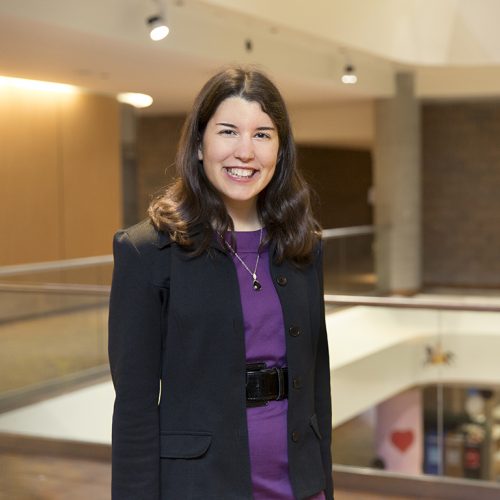Sarah Gagliano

Sarah Gagliano
Alumna, PhD (2016), Medical Science
“I wanted to perform research that challenges traditional boundaries.”
When I was considering graduate study, I knew I wanted to perform research that challenges traditional boundaries: cracking the genetic code responsible for “complex” diseases — those caused by an interplay between many genetic risk factors and environmental influences.
My work combines genetics, statistics, and computer science. I chose the University of Toronto partly because of its reputation as Canada’s top university, but also because it has several excellent departments allowing for interdisciplinary research. In particular, U of T has an interdisciplinary graduate unit, the Institute of Medical Science, which was ideal for my interdisciplinary research goals.
For my dissertation, I am performing high-level statistics on biological information to develop methods for identifying novel genetic contributors that increase one’s risk of developing a complex disease. This is all done through computer programs run on Canada’s largest “supercomputer,” to which I have access through U of T.
I went to San Diego for a week in October 2014 to attend and present at the largest conference in human genetics. In my presentation, I compared my computer-based method for identifying genetic risk factors to two other published methods. This was a very collaborative project in which I had been in email contact with several of the authors of those two other methods throughout the project. In San Diego I finally got to meet some of those authors in person.
I’ve also taken advantage of non-academic opportunities. I participated and completed both the Graduate Professional Skills (GPS) program and the Advanced University Teaching Preparation (AUTP) program. The skills I gained from these programs have been very helpful, and I strongly recommend others to pursue them.
The independence in graduate school is excellent for self-motivated individuals. I’d tell students thinking of graduate work to do research ahead of time on potential graduate supervisors. Look into their previous publications, meet with them, and meet with their current students to get a whole picture. I also recommend visiting the campus in person to see if it is the right fit. You will be spending several years of your life there, and so the setting plays an important role in a positive graduate experience.
Originally from the suburbs, I can really appreciate the beautiful old buildings scattered throughout the campus. Other aspects of campus life are important, too. The drop-in fitness classes on campus are fun, and a great way to take a break from the lab.
As a bonus, through athletics, I have been privileged to support those dealing with complex illnesses, which are the basis of my research. Through an opportunity at U of T, I became part of a fitness group where I help in leading warm-ups at events scattered around the city, many for charitable events.
Each day I am helping to alleviate complex disease not only through my research, but also in my daily life through face-to-face interactions. Opportunities through writing and athletics that have arisen at U of T have allowed me to appreciate the value of my research in a much more personal and real manner.
Sarah is a recipient of the Hunter Graduate Award, CIHR Strategic Training for Advanced Genetic Epidemiology (Stage), and Weston Brain Institute Inernational Felllowsip in Neuroscience.
